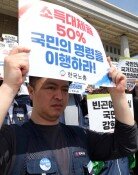Stop infeasible campaign pledges
As the Dec. 19 presidential election approaches, the candidates of the ruling and opposition parties are inundating voters with pledges they want to hear, even incorporating the words half price" in their promises. Park Geun-hye of the ruling Saenuri Party said she will relieve half of the people`s worries by pledging the alleviation of household debt, free daycare for children under age 5, free education for high school students, the halving of college tuition, and full coverage of all medical expenses for the four major diseases covered by national health insurance.
Her rival, Moon Jae-in of the main opposition Democratic United Party, said he will have the government take on the burden of the working class and to halve basic living costs. To achieve this goal, he pledged to cap the maximum premium of health insurance subscribers to 1 million won (923 U.S. dollars). He also promised free education for high school students, cutting college tuition by half, and providing government support for housing rent.
All of these campaign pledges might be pleasant to hear, but they are nothing more than empty promises without feasible financing methods. The late former President Roh Moo-hyun once said, I promised economic growth of 7 percent in the 2002 presidential election because I was challenged by rival Lee Hoi-chang, who pledged 6 percent. Over his term, however, Roh achieved average annual growth of 4.3 percent, lower than the global average of 4.7 percent. Lee Myung-bak in his 2007 presidential campaign gave his 747 pledge, meaning 7-percent growth, per capita income of 40,000 U.S. dollars, and ascension to the worlds No. 7 economy. None of the pledges were realized, however.
The Korean economy grew just 0.1 percent in the third quarter from the second this year, signaling a deepening slump similar to what occurred in the aftermath of the 2007 global financial crisis. The next administration must revitalize the economy and help stabilize the job market. Flimsy commitments can hinder economic efforts after a president takes office. Roh had to struggle throughout his term to carry out his pledge to relocate the capital, and his successor Lee has suffered due to his nixed project of the grand canal project.
To carry out their promises, the ruling party`s Park said she will generate 135 trillion won (125 billion dollars) over her five-year term, while Moon promised 197 trillion won (182 billion dollars). They said they can achieve their goals through government spending cuts, tax revisions and social welfare reform. Yet all of these efforts have failed in the past. Both Park and Moon received low scores in a study conducted by The Dong-A Ilbo and the Korean Association of Party Studies on the feasibility of financing campaign promises, meaning they will find it tough to keep their pledges if elected.
Voters should ignore catchy phrases as half price or cut in half when choosing the next president because such flowery talk will adversely affect their livelihoods. A TV presidential debate on the economy is slated for Monday. On that day, the people should focus on a candidates strategies to carry out pledges rather than on rhetoric on political ideologies.







